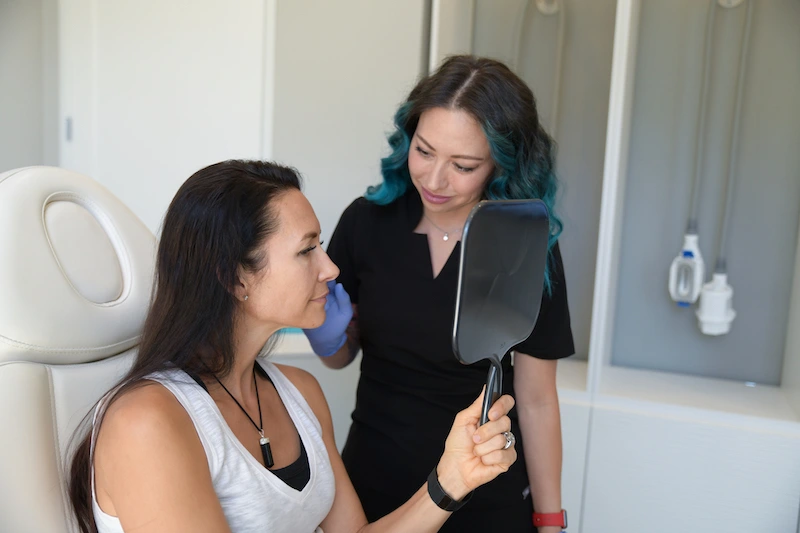
When you think of sensitive skin, what comes to mind? For many of our new patients at Beyond Aesthetics, it’s a tingly sensation when using a new product or experiencing skin flare-ups and acne breakouts after using a new product. But what if what you’re labeling as “sensitive skin” is actually something else entirely—like a weak skin barrier?
What is your skin barrier?
Your skin, the body’s largest organ, plays an invaluable protective role. Imagine the outermost layer as a brick wall. This wall keeps beneficial elements in and harmful environmental toxins out. However, neglect it, and not only will your skin deteriorate, but your internal health could suffer. Age naturally weakens this barrier, but improper care can expedite this process.
Signs of a weak barrier include:
- Flushing or breakout post-product use
- Unusual sensations (tingly/hot/itchy) after applying products
- Skin flakiness
- Extreme sensitivity to fragrances
- Sudden flare-ups
So, do you really have sensitive skin?
Confusion arises because skin sensitivities can mimic reactive skin. While genetics predisposes individuals to sensitivities, conditions like rosacea exemplify skin sensitivity. Rosacea flare-ups can result from factors like spicy foods, heat, or certain skincare products. Although genetics play a part in true rosacea, a weak skin barrier can also contribute to its development. Once present, while rosacea can be managed, it can never be entirely eradicated. The complexity surrounding reactive skin versus skin sensitivities makes professional advice crucial.
Why your skin might be reactive
Unveiling the nuances of skin health often leads us to a pivotal question: is your skin truly sensitive, or is it reactive due to external factors and practices? It’s essential to differentiate between the two, as each has its set of causes and treatments. Common triggers and habits that might be secretly sabotaging your skin’s equilibrium include:
Over-exfoliating can compromise your skin’s health. While exfoliation aids in removing dead skin cells, overdoing it with products containing AHAs, BHAs, or physical beads can be harmful.
Prescription retinols, if misused, can do more harm than good, stripping your skin of its essential oils and weakening the barrier. Even over-the-counter retinol requires careful use. Coupled with sun exposure, it accelerates aging. Remember, the best anti-aging formula is “good skincare + sunscreen.”
Weather changes can also influence your skin’s health. In Southern California, for instance, skin tends to dry out during colder months, while summer can lead to breakouts from excessive sweating.
Low-quality products may not provide the care your skin needs. In fact, many over-the-counter products aren’t as effective as they claim. Medical-grade skincare undergoes rigorous testing, ensuring optimal results. Don’t be deceived by terms like “dermatologist recommended.” Always understand what you’re applying.
Never used skincare products? This might be a clue. If you’ve only recently begun a skincare routine or avoid products due to adverse reactions, it’s possible that your skin barrier is compromised.
Solving Reactive Skin Issues
Maintaining skin health requires more than just a nightly cleanse. Getting advice from a licensed esthetician is important even if you’re going to a dermatologist. And while we can provide guidance on whether you have genuine sensitive skin or a weakened barrier, daily commitment to a home skincare routine is indispensable. Reactive skin issues can be resolved long-term, while true skin sensitivities need ongoing management through treatments. Whatever your skin concern, Beyond Aesthetics is here to guide you on the journey to radiant, healthy skin.
